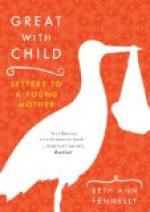If individuals and circumstances were everywhere combined, with the special purpose to oppose the intentions of nature respecting the human being, at every step of his progress from the cradle to maturity, and from maturity to the grave, I hardly know how they could contrive to accomplish such a purpose more effectually than it is at present accomplished. But it is proper that I should here explain a little.
All our family arrangements tend to repress amusement. Everything is contrived to facilitate business—especially the business or employments of adults. The child is hardly regarded as a human being,—certainly not as a perfect being. He is considered as a mere fragment; or to change the figure, as a plant too young to be of any real service to mankind, because too young to bear any of its appropriate fruits. Whereas, in my opinion, both infancy and childhood, at every stage, should bring forth their appropriate fruits. In other words, the child of the most tender years should be regarded as a whole, and not as the mere fragment of a being; as a perfect member of a family—occupying a full and complete, only a more limited sphere than older members: and all the rules and regulations and arrangements of the family should have a reference to this point. So long as a child is reckoned to be a mere cipher in creation, or at most, as of no more practical importance, till the arrival of his twenty-first birth day, or some other equally arbitrary period, than our domestic animals—that is, of just sufficient consequence to be fed, and caressed, and fondled, and made a pet of—so long will our arrangements be made with reference to the comfort and happiness of adults. There may indeed be here and there a child’s chair, or a child’s carriage, or newspaper, or book; but there will seldom be, except by stealth, any free juvenile conversation at the table or the fireside. Here the child must sit as a blank or cypher, to ruminate on the past, or to receive half formed and passive impressions from the present.
The arrangements of the infant school, also, seem designed for the same purpose—to repress as much as possible the infantile desire for amusement. Not that this was their original, nor that it now is their legitimate intention. Their legitimate object is, or should be, not to develope the intellect by over-working the tender brain, but to promote cheerfulness and health and love and happiness, by well contrived amusements, conducted as much as possible in the open air; and by unremitting efforts to elicit and direct the affections.
Infant schools should repress rather than encourage the hard study of books. Lessons at this age should be drawn chiefly from objects in the garden, the field, and the grove; from the flower, the plant, the tree, the brook, the bird, the beast, the worm, the fly, the human body—the sun, or the visible heavens. These lessons, whether given by the parent, as constituting a part of the family arrangements, or by the infant or primary school teacher, should, it is true, be regarded for the time being as study, but they should never be long; and they should be frequently relieved by the most free and unrestrained pastimes and gambols of the young on the green grass, or beside the rippling stream, uninfluenced, or at least unrepressed, by those who are set over them.




